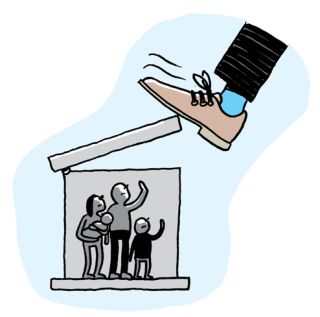Housing First, Not Hidden Homeless - Budget 2024

The latest data indicate that a record 12,259 people, including 3,594 children, accessed emergency homeless accommodation in the week 24-30 April 2023. Family homelessness has increased by 53 per cent (from 1,130 families in July 2016 to 1,733 in April 2023) since the beginning of the previous housing strategy, Rebuilding Ireland, and by 72 per cent since the introduction of Housing for All in September 2021. These are the ‘official’ data on homelessness. They do not include those staying with family and friends, they do not include rough sleepers, they do not include homeless families temporarily accommodated in housing owned by their Local Authority, they do not include the women and children in domestic violence refuges, and they do not include asylum seekers in transitional accommodation. In 2019, a report commissioned by the European Commission referred to the current state of data collection on homelessness in Ireland as “statistical obfuscation if not ‘corruption’.” (Daly, 2019). This is unlikely to change with Housing for All. In July 2021, the Department of Housing, Local Government and Heritage reclassified dependents aged 18+ as adults, thus distorting the number of adults, families, and dependents accessing homeless accommodation.
Homelessness is becoming normalised. According to the Homelessness Quarterly Progress Report (October to December 2022), 53 per cent of all single homeless households, similar to the year before, while 64 per cent of all family households accessing emergency accommodation had been doing so for more than six months, an increase from 58 per cent the previous year (Department of Housing, Local Government and Heritage, 2023). The most recent rough sleeper count, taken in November 2022, showed 91 persons sleeping rough in Dublin over the course of the week of the count, down from 94 in October of the previous year.
Expenditure in this area peaked in 2022, at €213 million, the highest since 2019 when it was €183 million, and an increase of almost five hundred per cent on the cost of emergency accommodation in 2014. This compares to a spend on homelessness prevention and tenancy sustainment of just €15.6 million (Department of Housing, Local Government and Heritage, 2023). Budget 2023 increased spending on homelessness services. While this is currently necessary, inadequate resources are being allocated to homelessness prevention. In 2022, Local Authorities spent almost 14 times more on emergency accommodation than homelessness prevention.
Social Justice Ireland welcomed the commitment in Housing for All to the eradication of homelessness by 2030 but were disappointed that this did not extend Housing First beyond vulnerable adults to include families experiencing homelessness. In Budget 2023, Government committed increased funding to providers of emergency homeless accommodation, rather than homelessness prevention. In its policy statement, IHREC recommended an amendment to section 10 of the Housing Act 1988 to limit the amount of time a family may spend in Family Hubs as well as other forms of emergency housing, a similar regime as in Scotland and something that Social Justice Ireland has been advocating for. Social Justice Ireland calls on Government to expand the remit of Housing First in Budget 2024 to homeless families accessing emergency accommodation, at a cost of €200m, achieved by the winding down of regressive subsidies.
Budget Choices 2024 is available to download here.